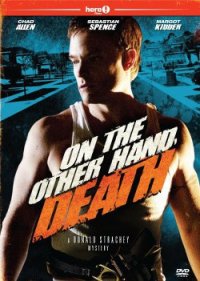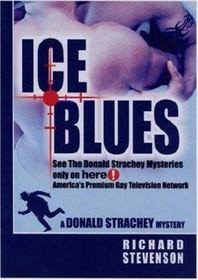Strachey's Folly - Stevenson Richard (читать книги онлайн регистрации .TXT) 📗
I asked Vicknicki for the names of a couple of LoBello's closest friends, and I wrote them down.
Dormer said, "The TV news also reported that the quilt panel with Jim's name on it had been vandalized—parts of it ripped off. Do you guys think that has anything to do with Jim's disappearance and two of his ex-boyfriends getting shot? It's hard to imagine Carmen being mixed up in anything violent. But he's always been a strange man. Creative but strange."
Vicknicki and Dormer both watched me carefully as I replied, "I don't know yet what to make of any of these violent and destructive events. But it wouldn't surprise me at all if it turned out to be a string of ugly coincidences."
Dormer considered this gravely, Vicknicki continued to gaze at me with a look of penetrating curiosity, and Timmy gave me his droll, skeptical once-over. Lucky for me, the waiter reappeared and, a little more insistent than he'd been the first time, asked if we were ready to order yet. We made some snap decisions, none of which we came to regret.
Between the soup course and the entrees, I excused myself, found a pay phone, and tracked down Chondelle Dolan. I asked her about the murder of Bryant Ulmer and what she knew about Alan McChesney. Ulmer died in an unsolved street robbery on a Capitol Hill side street the previous January, Dolan recalled. But it wasn't a case she had worked on, so she said she would have to look into the file and check on the investigation's current status.
Alan McChesney, Dolan said, was a formidable if not particularly well-liked man on the Hill. As Burton Olds's chief of staff, JMcChesney was also one of the most influential homosexuals in official Washington, not counting, of course, those six or eight or ten gay or lesbian representatives and senators who were either un-, discreetly, or pathologically closeted. I asked if IMcChesney's moving into Ulmer's job after his death had had any political, professional, or personal repercussions that Dolan knew of. She said she didn't know but she'd check.
Then Dolan said, "Donald, you don't want to hear this, but you better know it. Ray Craig had you tailed out to Silver Spring earlier. Ray stayed with Timothy at GW, and an officer I know named Filbert Furlong tailed you to the apartment of Mrs. Lila Suter."
"Tell Filbert he does good work. I had no idea. What's he look like?"
"Oh, he's the invisible man."
"I'm calling from the Bangkok Flower, up from Dupont Circle. Is Filbert skulking in here somewhere, wearing a camouflage of peanut sauce and tiny prawns?"
"No, he's off duty now. It's probably some other officer there amongst the rice noodles."
"Do you have any clearer idea of why Craig is so suspicious of Timmy and me?"
"Wish I did. Like I said, it's probably a failure of imagination. But I've got other bad news for you, too, Donald."
"What's that?"
"Ray's been talking to a captain he's tight with by the name of Milton Kingsley. Kingsley is probably well aware that Ray and another Caucasian lieutenant do imitations of the captain that are what you really have to call unflattering. But these two use each other and need each other, so the captain puts up with Ray. But now, a buddy of mine in administration told me today, Captain Kingsley is taking a trip. Papers have been processed for a plane ticket and expenses for—I hate to say it."
"Don't tell me."
"Yep. Cancun, Mexico."
"When?"
"Wednesday."
When I got back to the table, Timmy, Dormer, and Vicknicki were busy conjuring up conspiracy theories—most of them political and far-fetched—that might explain the connections between Bryant Ulmer's shooting, Maynard's, and the Jim Suter quilt panel and vandalism. And Dormer and Vicknicki didn't even know about the mysterious appearance of Betty Krumfutz or a Betty Krumfutz impostor at the quilt panel and the fact that Suter met his Mexican boyfriend, Jorge, through Alan McChesney, who had once been Mrs. Krumfutz's chief of staff and, following Bryant Ulmer's violent death, was now Burton Olds's.
I added nothing to this free-form speculation and pooh-poohed much of it. But I listened to and considered all of it. And by the time the conversation had concluded, I needed to ask Timmy for two of the aspirin he always carried with him—four tiny pills in a small plastic vial in the inner recesses of his jacket pocket, as if he were a spy on a dangerous mission deep inside enemy territory. I also tried to figure out who in the restaurant might be a D.C. plainclothes police officer watching us—and listening?—but I gave up after failing to narrow the field to fewer than seventeen possibilities.
Chapter 15
A Names Project speaker at the start of the candlelight march on Friday night had termed it "a miracle" that the entire outdoor quilt-display weekend would be warm and dry, but Tuesday morning was unmiraculous and rainy. The tables outside the cafe with the excellent croissants were deserted, and we sat jammed inside the place, semimuscular thigh to semimuscular thigh with Capitol staffers jolting themselves with caffeine into states of wakefulness sufficient for conducting the nation's business.
Timmy read aloud from the Post while I nursed a double espresso and an imaginary cigarette. Dana Mosel had not yet filed her follow-up story on the Suter quilt panel—Dormer and Vick-nicki had told us Mosel phoned them and they'd given her an earful on Suter's treatment of the legions of men in his life—but the paper had printed a brief update on Maynard's shooting and his improving condition. Ray Craig was quoted as saying that the police had no suspects but were pursuing "a number of leads."
"I wonder what 'a number of leads' means," Timmy said. "Is it a high number of leads or a low number of leads, and what are they?"
"That's just a thing police say to reporters," I told him. "It doesn't necessarily mean anything."
"I guess we're two of the leads if they're following us around."
I had relayed to Timmy the night before Chondelle's report to me on the D.C. Police Department's twenty-four-hour surveillance of the both of us, and he had received the news glumly.
"The other lead," I said, "is the two witnesses to the shooting saying two Mexicans did it."
"The police are not releasing that information to the press. I wonder why. That makes me nervous."
"I have to admit, Timothy, that I'm curious about that, too. Craig may actually know more about the shooter and his friend than Chondelle has been able to find out. And maybe whatever he knows has got this Captain Kingsley flying down to the Yucatan the same day I'm flying. It would seem unlikely that they'd assign a captain to follow me up and down the Western Hemisphere, so our travel dates could be pure coincidence. Although, it's also possible they scoured the airlines' reservation lists for my name, and when they spotted it, they saw it as an opportunity for a department big cheese to take a pleasant trip at taxpayers' expense while he keeps an eye on me. Or maybe they sincerely believe that I'm at the center of something important."
Timmy stared at me in amazement over what he obviously saw as my thickheadedness. "But, Don, obviously you are at the center of something important." "Think so? We'll see."
Timmy just shook his head, then read more from the Post. Timmy told me that Bob Dole, numbers low and stagnant, was still predicting that the public would catch on to the ethically dubious Clintons before election day and virtue—i.e., Dole— would prevail.
I said, "Let's hope not."




